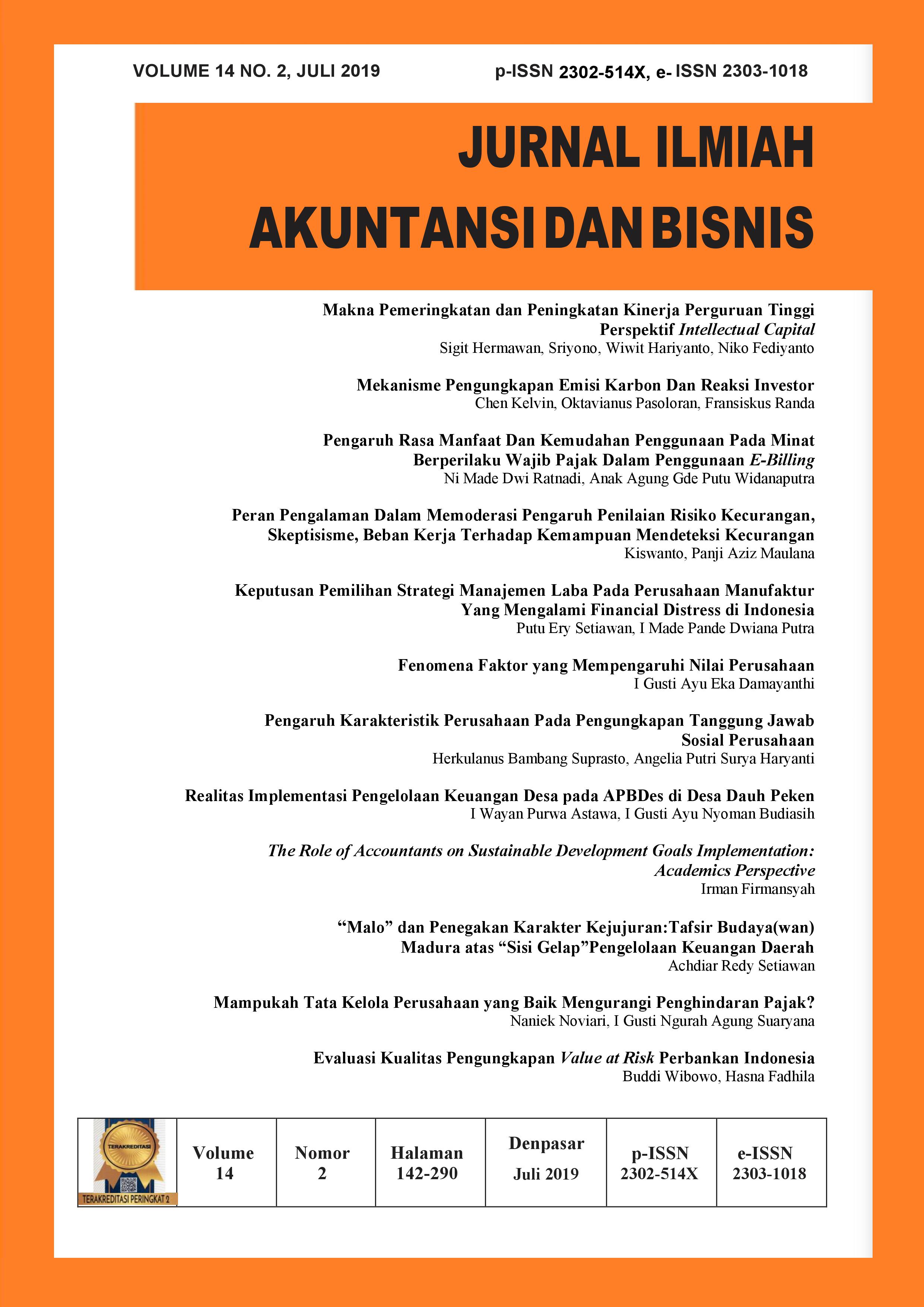Pengalaman Memoderasi Penilaian Risiko Kecurangan, Skeptisisme, Beban Kerja pada Kemampuan Mendeteksi Kecurangan
Abstract
The purpose of this study was to analyze the effect of fraud risk assessment, skepticism, and workload on the ability to detect fraud with experience as a quasi-moderating variable. The population and sample of this study are auditors who work in the Financial and Development Supervisory Agency (BPKP) of Central Java Province. The sample in this study was 41 auditors. Data collection using a questionnaire. The method of data analysis in this study was moderated regression analysis (MRA). The results showed that fraud risk assessment, skepticism and workload had a significant effect on the ability to detect fraud. Experience could moderate the effect of the relationship between risk assessment of fraud and the ability to detect fraud.
Keywords: Risk of fraud assessment, fraud detection, experience
Downloads
References
Aminudin, M. R., & Suryandari, D. (2016). Facto rs Affecting Auditor ’ s Ability i n Detecting Fraud through Professional. Accounting Analysis Journal, 5(4), 344–351.
Anggriawan, E. F. (2014). Pengaruh Pengalaman Kerja, Skeptisme Profesional Dan Tekanan Waktu Terhadap Kemampuan Auditor Dalam Mendeteksi Fraud (Studi Empiris Pada Kantor Akuntan Publik Di Diy). Jurnal Nominal, 3(2). https://doi.org/10.1017/CBO9781107415324.004
Butar, S. G. B., & Perdana, H. D. (2017). PENERAPAN SKEPTISISME PROFESIONAL AUDITOR INTERNAL PEMERINTAH DALAM MENDETEKSI KECURANGAN ( Studi Kasus pada Auditor Perwakilan BPKP Provinsi Jawa Tengah ). Jurnal Ekonomi Dan Bisnis, 20(1), 169–189.
Carpenter, T. D., & Reimers, J. L. (2013). Professional Skepticism: The Effect of a Partner’s Influence and The Level of Fraud Indicators On auditors’ Fraud Judgment and Action. American Accounting Journal, 25(2), 45–69.
Fa’ati, I. A. N. I., & Sukirman. (2014). Pengaruh Tipe Kepribadian dan Kompetensi Auditor terhadap Skeptisme Profesional Auditor (Studi Empiris Pada KAP KOta Semarang). Accounting Analysis Journal, 3(3), 370–377.
Fullerton, R. R., & Durtschi, C. (2005). The Effect of Professional Skepticism on the Fraud Detection Skills of Internal Auditors. Utah State University, (435), 1–38. https://doi.org/10.2139/ssrn.617062
Hartan, T. H., & Waluyo, I. (2016). Pengaruh Skeptisme Profesional, Independensi, dan Kompetensi terhadap Kemampuan Mendeteksi Kecurangan (Studi Empiris pada Inspektorat Daerah Istimewa Yogyakarta). Jurnal Profita, 3(1), 1–20.
Heider, F. (1958). The psychology of interpersonal relations. New York: Wiley.
Jaffar, N. (2008). Effects of Ability To Assess Fraud Risk , Fraud Risk Level and Personality Factors on the Ability To Detect the Likelihood of Fraud Nahariah Jaffar . Thesis. Malaysia: Universiti Putra Malaysia.
Jaffar, N., Haron, H., Mohd Iskandar, T., & Salleh, A. (2011). Fraud Risk Assessment and Detection of Fraud: The Moderating Effect of Personality. International Journal of Business and Management, 6(7), 40–51. https://doi.org/10.5539/ijbm.v6n7p40
Jeppesen, K. K., Leder, C., & Jeppesen, K. K. (2016). Auditors ’ experience with corporate psychopaths. https://doi.org/10.1108/JFC-05-2015-0026
Joseph, O., Odhiambo, A., & Byaruhanga, J. (2015). Effect of Internal Control on Fraud Detection and Prevention in District Treasuries of Kakamega County. International Journal of Business and Management Invention, 4(1), 47–57.
Kartikarini, N., & Sugiarto. (2016). Pengaruh Gender , Keahlian , dan Skeptisisme Profesional terhadap Kemampuan Auditor Mendeteksi Kecurangan ( Studi pada Badan Pemeriksa Keuangan Republik Indonesia ). Simposium Nasional Akuntansi XIX, Lampung, 2016, 1–31.
Knapp, C. A., & Knapp, M. C. (2001). The effects of experience and explicit fraud risk assessment in detecting fraud with analytical procedures. Accounting, Organizations and Society, 26, 25–37.
Kummer, T.-F., Singh, K., & Best, P. (2015). The effectiveness of fraud detection instruments in not-for-profit organizations. Managerial Auditing Journal, 30(4/5), 435–455. https://doi.org/10.1108/MAJ-08-2014-1083
López, D. M., & Peters, G. F. (2012). The effect of workload compression on audit quality. Auditing, 31(4), 139–165. https://doi.org/10.2308/ajpt-10305
Lubis, A. I. (2009). Akuntansi Keperilakuan (Edisi 2). Jakarta: Salemba.
Mangiri, Y. S. (2015). Pengaruh Fraud Risk Assesment dan Kecakapan Auditor terhadap Kualitas Audit Aparat Inspektorat dalam Pengawasan Keuangan Daerah pada Kantor Inspektorat Sulawesi Tenggara. Skripsi. Makasar: Universitas Hasanudin Makasar.
Mohd-Sanusi, Z., Mohamed, N., Omar, N., & Mohd-Nassir, M.-D. (2015). Effects of Internal Controls, Fraud Motives and Experience in Assessing Likelihood of Fraud Risk. Journal of Economics, Business and Management, 3(2), 194–200. https://doi.org/10.7763/JOEBM.2015.V3.179
Nassir, M. D. M., Mohd-Sanusi, Z., & Ghani, E. K. (2016). Effect of Brainstorming and Expertise on Fraud Risk Assessment. International Journal of Economics and Financial Issues, 6(S4), 62–67.
Nasution, H., & Fitriany. (2012). Pengaruh Beban Kerja, Pengalaman Audit dan Tipe Kepribadian terhadap Skeptisme Profesional dan Kemampuan Auditor dalam Mendeteksi Kecurangan. Simposium Nasional Akuntansi XV, Banjarmasin, 15, 1–51.
Noviyanti, S. (2008). Skeptisme Profesional Auditor dalam Mendeteksi Kecurangan. Jurnal Akuntansi Dan Keuangan Indonesia, 5(I), 102–125.
Oktarini, K., & Ramantha, I. W. (2016). Pengaruh Pengalaman Kerja Dan Kepatuhan Terhadap Kode Etik Pada Kualitas Audit Melalui Skeptisisme Profesional Auditor. E-Jurnal Akuntansi UNUD, 15, 754–783.
Payne, E. A., & Ramsay, R. J. (2005). Fraud risk assessments and auditors ’ professional skepticism. Managerial Auditing Journal, 20(3), 321–330. https://doi.org/10.1108/02686900510585636
Suraida, I. (2005). Pengaruh Etika, Kompetensi, Pengalaman Audit dan Risiko Audit terhadap Skeptisisme Profesional Auditor dan Ketepatan Pemberian Opini Akuntan Publik. Sosiohumaniora, 7(3), 186–202.
Usman, H., & Rahmawati. (2014). Pengaruh Beban Kerja Dan Pengalaman Auditor dalam Mendeteksi Kecurangan. Jurnal Akuntansi Dan Investasi, 15(1).
Yusrianti, H. (2015). Pengaruh Pengalaman Audit , Beban Kerja , Task Specific Knowledge Terhadap Pendeteksian Kecurangan. Jurnal Manajemen Dan Bisnis Sriwijaya, 13(1), 1–18.
Yustrianthe, R. H. (2012). Beberapa Faktor yang Mempengaruhi Audit Judgement Auditor Pemerintahan. Jurnal Dinamika Akuntansi, 4(2), 72–82.




















